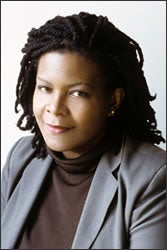The following op-ed by visiting Professor of Law Annette Gordon-Reed ’84, “Histories Distorted,” appeared on the New York Times blog Room-for-Debate on October 8, 2009.
In an article published on Wednesday, The Times reported on Michelle Obama’s ancestry, tracing her maternal line back to her great-great-great-grandparents, a slave girl and a white man, and their son, Dolphus T. Shields, who was born in the 1850s.
While these findings tell of Michelle Obama’s roots, for many Americans her family’s story will also bring into focus a common narrative, which runs through the history of this nation. We asked some historians and writers, why has it taken so long for Americans to appreciate these deep multiethnic connections?
Gordon-Reed responds to the question:
The family stories of black Americans and the findings of population geneticists make clear that Michelle Obama’s family history is far from unique. The vast majority of black Americans whose ancestors were enslaved in North America have some degree of mixed ancestry.
Appearances deceive. People get thrown off merely looking at the surface. Do you have dark skin? Only people who are fair-skinned are thought to have white ancestry. And anyone who “looks” white can’t have any African ancestry. Those presumptions go nicely with the country’s historic racial program: to fit everyone into their racial “place” to determine how they should be treated.
That a person who looks like Mrs. Obama is not “all” black destabilizes things, especially when one considers the implications. Are people who look “all” white really that? I remember speaking with one white Virginian who insisted that the white Virginians’ fetish for genealogy stems from a desire “to prove who is white.”
That we’ve just started speaking openly about the complexity of black ancestry doesn’t surprise. After all, white Americans, through law and social customs, invested heavily in promoting the idea that people of African descent were fundamentally different (inferior) types of human beings than whites. Slavery enforced that notion, and that’s what segregation was all about.
What happens when you recognize that you and fellow whites share a bloodline with the people you are claiming are so different? And then there’s the fact that none of this has made much difference to black Americans. Having a white father or great-great-great grandfather didn’t mean much: they were defined as “negro” or “black” and kept their place in the racial hierarchy.
There’s also a lot of white Southern anxiety in denials of these tangled blood lines. Acknowledging them requires admitting what went on in the South; both the prevalence of the rape of black women and, in some instances, long-term connections between white men and black women in slavery and outside of it.
The evidence indicates that Southern white men of the 18th and 19th centuries were more used to sleeping with black women than white men today in all regions of the country; despite the popular notion that we’re living in a brand new age of interracial mixing. Some of those planters really were living like polygamous patriarchs of old with wives and concubines and bunches of kids. That’s the truth of early American history.
Annette Gordon-Reed is the author of “The Hemingses of Monticello: An American Family,” which won the Pulitzer Prize and the National Book Award. She is currently the Charles Warren Visiting Professor of Legal History at Harvard Law School.
